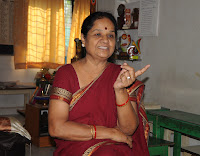With the founding headquarters of India’s most renowned institution propagating the study of Sanskrit language placed here along with a special university teaching modern subjects associated with traditional wisdom of Sanskrit, Nagpur’s Sanskrit theatre is set to bloom like never before.
Award-winning director in Marathi amateur theatre, Roshan Nandavanshi dared to submit an entry in the Sanskrit Theatre Festival last year and his experience in his own words was “amazing”.
“We won many prizes and stood third in the contest, on our debut. My artists are proud to speak Sanskrit. They appear more confident on stage, even their Marathi has improved,” says Roshan, reiterating his resolution to participate in the Sanskrit Theatre Festival this year, too.
Many groups like Roshan’s are gearing up to take up Sanskrit theatre these days, thanks to senior theatre activist Shraddha Telang’s dedicated effort since last two decades. A retired teacher of Sanskrit at Bhide Kanya Shala, and Joint Secretary of Sanskrit Bhasha Pracharini Sabha, Nagpur, Telang is the one who has single-handedly nurtured and protected Sanskrit theatre in Nagpur through odd times, helping it turn into a full fledged activity. However, Shraddha Telang humbly gives all credit to the institutions propagating the study of Sanskrit language.
“Sanskrit Bhasha Pracharini Sabha and Kavi Kulguru Kalidas Sanskrit University are the main pillars encouraging youngsters to take up Sanskrit to build their careers,” she says. While the 65-year-old ‘Pracharini Sabha’ is now the leading Sanskrit body in India; Kalidas University, too, is encouraging good Sanskrit plays by giving them exposure as varsity’s official entry in international-level Sanskrit conferences.
 |
| Shraddha Telang (Pic by Anil Futane) |
“Drama is regarded as the highest achievement in Sanskrit literature. I used to act in Marathi plays during my college days. As a teacher and being associated with Pracharini Sabha, I now concentrate on Sanskrit theatre,” Telang recalls. She has as many as 25 Sanskrit plays, and many state-level awards to her credit as a director, actor and producer. However, her contribution to Sanskrit theatre, as a promoter and patron, is a lot more than this.
“As a Sanskrit lover, the ‘dead language’ remark for the mother of all Indian languages is very painful. But, unfortunately, it is true as little significant is being produced as ‘literature’ in Sanskrit these days. We have our greatest wisdom written in Sanskrit only, but, what about new literature?” she asks, raising the genuine issue. She also provides solution to the issue. “We have scholars of Sanskrit around and they are ready to help. When I requested Dr Leena Rastogi to translate a Marathi play in Sanskrit for me, she was more than happy,” says Telang, who has urged many scholars to write, speak in Sanskrit and act in such plays.
Sanskrit drama is no more just mythology or stories about legends of Kings and Queens. The present theatre deals with contemporary issues of the common man. They use modern techniques and simpler, conversational form of language. Hence, Nagpur’s Sanskrit plays are earning accolades everywhere. Two plays translated in Sanskrit by Dr Leena Rastogi -- ‘Bandu Abhinayam Karoti’ and ‘Gruhahinaha’ -- have been adjudged best in state-level contest in last two years. “If we repeat the performance this year too, our group will earn the prestigious ‘Manyawar’ honour,” Telang says with a smile. Last year, five out of nine entries in State Sanskrit Theatre Festival were from Nagpur. Hence, the contest was held in the city. “We want more and more people to see Sanskrit plays. In Nagpur, we have an ideal atmosphere. Hence, Sanskrit theatre contest should be organised here only,” she demands.
It is difficult, but mellifluent in speech, ancient, but melodious and rigid, but flowing in recitation -- the language of the deities is all set to make re-entry in the Indian lifestyle – this time in the form of theatre – through the Sanskrit plays of Nagpur.





 'Theatre Around' my new weekly column started in a special 'Sunday Sundae' suppliment of 'The Hitavada' Nagpur CityLine, from May 13. This column aims to highlight the contribution of non-Marathi theatre activity in Nagpur city's Fine Art scene. It started with an overview of Bengali Theatre, led by noted producer-director Raja Mukherjee. Here is the first part published on May 13, 2012....
'Theatre Around' my new weekly column started in a special 'Sunday Sundae' suppliment of 'The Hitavada' Nagpur CityLine, from May 13. This column aims to highlight the contribution of non-Marathi theatre activity in Nagpur city's Fine Art scene. It started with an overview of Bengali Theatre, led by noted producer-director Raja Mukherjee. Here is the first part published on May 13, 2012....
